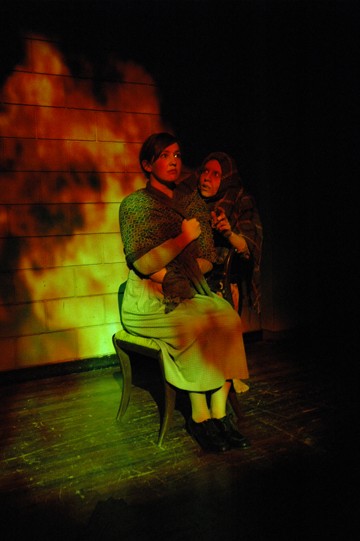WHAT: A Bright Room Called Day WHEN: April 17 – 25 WHERE: Stoll Thrust Theatre, Rarig Center TICKETS: $12 student at door, $10 preorder Vergangenheitsbewältigung is not an easy word to say for Americans, but for Germans it has been an even more difficult term. It means âÄúcoming to terms with the pastâÄù and is the central theme of âÄúA Bright Room Called Day,âÄù which follows the fall of the Weimar Republic and the rise of Nazism through the eyes of everyday Berlin residents. The performance sheds light on the question, âÄúWhat were average German citizens thinking and doing during HitlerâÄôs rise?âÄù Though GermanyâÄôs role in WWII is often seen in black and white today, âÄúA Bright Room Called DayâÄù seeks to illustrate the confusion and uncertainty felt by Germans in the 1930s. The setting of the play is the small apartment of actress Agnes Eggling , played by Anna Hickey. She and her friends, who are artists of varying media, witness the slow slide into fascism, each from a different perspective. In the beginning of the play, the Nazi Party is just another excessive political organization vying for seats in the German government. Agnes and her friends argue regularly about the different political ideologies that are trying to take hold in Germany. Genuinely interested in an equal society, Agnes decides to join with the Communist Party and contribute her skills as an actress, only to find the party crippled by infighting. In one early scene, Agnes, still hopeful for the coming communist revolution and writing a play for the communists, is having trouble finding the word to complete her thought that Germany is âÄúperched on the brink of âĦâÄù She tries old age, a choice and even doom, but decides none of them to be quite right. Agnes does not yet know what the future will hold. An element of the surreal is added to the play in the form of Zillah, an American from the future. She travels to Berlin in order to learn about the politics of the Reagan administration, which she believes is turning toward fascism. The concreteness of her character is never clear as she participates in dialogue with the main characters. The play has a kind of supernatural feel at times that leaves the audience to wonder if what just happened really happened. The devil himself and his snarling underlings appear at the end of the first act, to the bewilderment of the actors, but by the beginning of the second act it was like it never happened. âÄúA Bright Room Called DayâÄù is an intense three-hour experience that mimics the slow tempo of a building sense of dread over the course of a decade. It doesnâÄôt feel as long as it sounds; the characters easily absorb the audience into their struggle. The play is not a tragedy, but it does reveal the sad confusion felt in pre-war Germany. Near the end, after the supreme power of Adolf Hitler is becoming a reality, Agnes gains awareness of what the implications of Nazism are. She revisits her unfinished sentence once again and declares soberly that Germany is âÄúperched on the brink of a crime.âÄù

Image by Ashley Goetz
The characters in “A Bright Room Called Day” find themselves suddenly emerged in a Nazi culture. PHOTO COURTESY COLLEGE OF LIBERAL ARTS
Vergangenheitsbewältigung is a bitter fruit
“A Bright Room Called Day” looks at the lives of Pre-war Berliners and their struggle to understand
Published April 23, 2009
0
More to Discover







